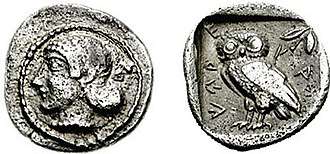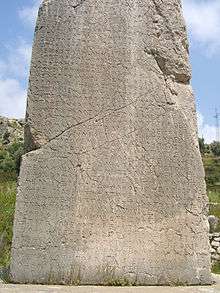Kheriga
Kheriga (in Greek Gergis) was a Dynast of Lycia, who ruled circa 450-410 BCE. Kheriga is mentioned on the succession list of the Xanthian Obelisk, and is probably the owner of the sarcophagus that was standing on top of it.[1][2]


Kheriga was son of Harpagus (Arppakhu in Lycian).[3][4] Arbinas was the son of Kheriga.[5][4]
Kheriga was ruler of Lycia at the time when Lycia was an ally of Athens in the Delian League. As the power of Athens weakened and Athens and Sparta fought the Peloponnesian wars (431–404 BC), the majority of Lycian cities defaulted from the Delian League, with the exception of Telmessos and Phaselis. In 429 BC, Athens sent an expedition against Lycia to try to force it to rejoin the League. This failed when Lycia's leader Kheriga (Gergis) defeated Athenian general Melesander.[6][7] The encounter is described in the inscription on the Xanthian Obelisk.[8]
References
- Keen, Antony G. (1998). Dynastic Lycia: A Political of History of the Lycians and Their Relations with Foreign Powers : C. 545-362 B.C. BRILL. p. 130. ISBN 9004109560.
- Long, Charlotte R. (1987). The Twelve Gods of Greece and Rome. Brill Archive. p. 145. ISBN 9004077162.
- Keen, Antony G. (1998). Dynastic Lycia: A Political of History of the Lycians and Their Relations with Foreign Powers : C. 545-362 B.C. BRILL. p. 117. ISBN 9004109560.
- Rhodes, Peter John; Osborne, Robin; Osborne, University Lecturer in Ancient History and Fellow and Tutor Robin (2003). Greek Historical Inscriptions: 404-323 BC. Oxford University Press. pp. 61–62. ISBN 9780198153139.
- Childs, William A. P. (1978). The City-reliefs of Lycia. Princeton University Press. p. 3.
- "Melesander, with the Athenian and confederate force he had on board his ships, landed in Lycia, and was defeated in the first battle, in which he lost part of his army and his own life." The History of the Peloponnesian War: Translated from the Greek of Thucydides. To which are Annexed, Three Preliminary Discourses. I. On the Life of Thucydides. II. On His Qualifications as a Historian. III. A Survey of the History. Edward Earle T.H. Palmer, printer. 1818. p. 173.
- Tuplin, Christopher (2007). Persian Responses: Political and Cultural Interaction with(in) the Achaemenid Empire. ISD LLC. p. 150. ISBN 9781910589465.
- Keen, Antony G. (1998). Dynastic Lycia: A Political of History of the Lycians and Their Relations with Foreign Powers : C. 545-362 B.C. BRILL. p. 129. ISBN 9004109560.